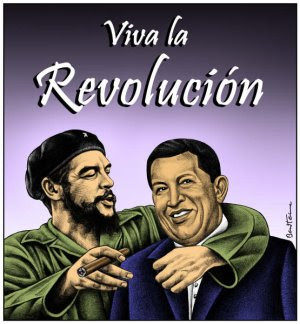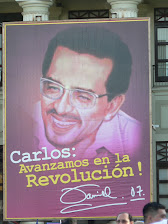
This is an important article, in my opinion, not just because of the credtials of the author (a widely respected US-based Cuban studies scholar and researcher) but also for its understanding of the complexities and evolution of political life in Cuba over the last five decades since the 1959 victory.
The article is taken from the March 1/2 edition of Counterpunch
http://www.counterpunch.org/valdes03012008.html
Felipe Stuart
Managua
Note: the reference to Capablanca in the heading is to José Raúl Capablanca, Cuban
born, world chess champion (1921-1927).
Cuba After Fidel
By NELSON P. VALDÉS
"If there is food for the people, risks do not matter"
Raúl Castro. 09/18/1994
"We will do what is best for each sector and place, and we will not unleash processes that could escape the control of the socialist State."
Carlos Lage. 12/19/1994
"I strongly believe that the answers to the current problems facing Cuban society ... require more variables for each concrete problem than those contained in a chess game."
Fidel Castro. 02/18/08
>* * * * * *<
The "Cuba experts" pontificating in the U.S. press claim that Raúl Castro, who replaced his famous brother in the new government, has appointed a hard-line anti-reformer to be the next person in line to succeed him. Why was José Ramón Machado Ventura selected instead of Carlos Lage? Have the "hardliners" won? Are the "reformers" in retreat? Is Machado Ventura more important to Raúl than Carlos Lage? What evidence, in fact, is there that political and economic differences exist within the new Cuban government? These are the wrong questions. Instead, we ought to pay attention to the assembled political team, their personal comparative advantages, experiences and functions that they could perform. In the Cuban political context, political people cannot be separated from their overall political environment and institutional linkages.
However, since foreign journalists and some scholars have made an issue of the selection of Machado Ventura over Carlos Lage, it is useful to discuss the service history of each.
Machado Ventura was born in 1930. 19 years older than Lage. Machado Ventura is one of the few educated people that fought with Raúl in the guerrillas. He was a founder of the Frank País Second Front guerrilla region. He served as the guerrillas' physician. By 1959 he had become comandante , the highest rank within the Cuban guerrilla forces. Lage was 8 years old when the guerrilleros seized power.
Machado Ventura became minister of health at age 29 (1960-1967). He helped [helped to?] conceive, create and run the Cuban medical system that made the island famous. He excelled in organizational skills. Carlos Lage graduated as a physician but did not have a military background.
Machado Ventura was a founder of the Communist Party (PCC ) in 1965; Lage at the time was 14 years old.
By 1968, because of his organizational skills, Machado Ventura was given the responsibility of cleaning up the serious problems that the Cuban Communist Party confronted in Matanzas province. (At the time a pro-Soviet faction, led by Aníbal Escalante, had engaged in political and intelligence activities that the Castro brothers considered dangerous and treacherous.) Also, in 1968 he had become a member of the Central Committee. From that point on, Machado Ventura's work concentrated on the one party organization. In 1971, he had the post of first party secretary of Matanzas Province. Then he had the responsibility of doing a similar work rebuilding the party system in Havana. In other words, he did NOT remain within the ministry of the Armed Forces but left it in order to be a civilian organizing the Communist Party ranks. He had the political credentials of having participated in the guerrilla war. Since 1974 he has been the person in charge of the organization department of the PCC.
He had a fundamental role in the institutionalization of the revolutionary process initiated by Raul Castro in 1976. Machado Ventura was the one responsible for implementing that process, first in Matanzas and then in the rest of the country. He was brought into the Political Bureau and the Secretariat of the
Communist Party owing to his work in the province of Matanzas. In 1976, Machado Ventura was elected to the new National Assembly [the legislature] and selected as a member of the Council of State.
Meanwhile, Carlos Lage was elected to the National Assembly and also became an alternate member of the Central Committee. At the time, Lage was a very successful and influential university student leader. The following year, he became a leading member of the Union of Young Communists. When in 1980 Lage was selected to be a deputy member of the Central Committee of the Communist Party, Machado Ventura had already been a full member of the PCC for 15 years.
The following year, Lage became secretary general of the Union of Young Communists, the highest position anyone could attain within the junior parallel organization of the communists of Cuba.
In 1986, Lage was selected to be a full member of the Central Committee. He also joined the "Grupo de Coordinación y Apoyo del Comandante en Jefe." This was the inner circle staff. Lage became the key coordinator within the Group .That same year, Machado Ventura was promoted to one of the vice presidencies of the Council of State.
When in 1990 Lage became a full member of the Political Bureau, Machado Ventura had already been one of its members for 15 years. Machado Ventura, at that time, took on the responsibility of organizational secretary of the Central Committee. Thus, while Lage was addressing matters of state policy and its implementation, Machado Ventura addressed personnel and cadre questions within the state, the government and the party.
As the economic crisis hit Cuba in 1991 after the disappearance of the Soviet bloc, Fidel Castro and the Grupo de Apoyo y Coordinación took on many economic and political responsibilities, and Carlos Lage was in the middle of it all. In 1992, he became secretary of the Council of Ministers and the following year he also assumed the responsibility of vice president of the Council of State. Lage is, without a doubt, brilliant, dedicated and disciplined . The Cuban people certainly know and respect him. Machado Ventura is not as well known by the Cuban people, despite his long record . But there is one sector of the society that knows "Machadito" very well the PCC membership.
Machado Ventura and Carlos Lage shared a number of positions: both were members of the Political Bureau and of the Council of State. Machado Ventura has been closer to Raul Castro in his daily work while Carlos Lage's ascendancy had been associated with close working relationship with Fidel Castro. Lage had worked as a physician abroad.
Nonetheless, both have worked together often enough. Raúl Castro has stated that there were numerous changes that had to take place. Some of those changes, he said, related to economic and political policies that will impact on the general population. These are the issues that have concerned Carlos Lage. However, for those changes to take place there is the profoundly important necessity of having the proper personnel to carry out such policies; that is a matter that the Communist Party will have to address and solve. Without the proper personnel and cadres, the economic and political policies will not be viable.
The reforms will be forthcoming, Raúl Castro said. Moreover, he specifically stated that the Cuban Communist Party had to become absolutely democratic in its internal work. He noted that there should be no fear of discrepancies and differences of opinion; that there should be no fear. If there were only one political party in the country, that party had to reflect the diversity of opinion. The party, he noted, had to be "more democratic". Questioning what is done and how it is done should become normal and natural. As far as Raúl Castro was concerned, Cuban society does not have "antagonistic contradictions." All that is necessary is that discussions should be handled in a mature manner and that the Communist Party be cohesive, objective and responsible. Last, but not least, any substantive economic or political reforms will be preceded by significant changes in state and government institutions. Indeed, the new president of Cuba said that Cuba's state institutions had gone through three major periods: 1959 to 1976, when ad hoc changes were made on the basis of revolutionary necessity and without any real formalization of procedures; 1976-1991, when the revolutionary regime was formalized and institutionalized, although some of the state apparatus resembled Soviet experiences; and, finally, the period after the demise of the Soviet bloc.

He said, "Finally, in 1994, the most critical moment of the Special Period, considerable adjustments were made leading to the reduction and merging of institutions as well as to the redistribution of the tasks previously entrusted to some of them. However, these changes were undertaken with the rush imposed by the necessity to quickly adapt to a radically different, very hostile and extremely dangerous scenario."
He went on to add, "In the fourteen years that have passed since then, the national and international scene has noticeably changed. Today, a more compact and operational structure is required, with a lower number of institutions under the central administration of the State and a better distribution of their functions. This will enable us to reduce the enormous amount of meetings, coordination, permissions, conciliations, provisions, rules and regulations, etc., etc. It will also allow us to bring together some decisive economic activities which are presently disseminated through various entities, and to make a better use of our cadres."
For such all-encompassing tasks the first vice president has much experience behind him, for he was a major player in an earlier effort in what was then named the "institutionalization of the revolutionary regime." José Ramón Machado Ventura, Carlos Lage and others will have a lot of work before them. All the talk about hardliners setting the tone of the new Raúl Castro administration is too simple and naive. In fact, the revolutionary regime confronts a variety of problems to address and as everyone in the leading positions acknowledges, it will be necessary to have diverse approaches depending on the difficulty to be solved and its complexity Raúl Castro has made clear, in numerous speeches, that his administration intends and will insist on airing differences and arriving at consensual decisions. That is neither the mentality nor approach of a phalanx of troglodytes. There is a collegial system in place. It will be further elaborated and institutionalized.
The question, in the final analysis, is not what role each person plays, but in what direction the Cuban revolutionary state moves. Such tasks will not depend on just a few individuals but in their interconnections and effectiveness.
To search merely for the "leading personalities" that promote "openings" and "liberalization" is to ignore the real revolution in the revolution that has been announced.
*José Raúl Capablanca, Cuban born, was world chess champion (1921-1927).
Nelson P Valdés is a Professor of Sociology at the University of New Mexico.
He thanks his colleague and friend Robert Sandels for his corrections, comments and suggestions.



No comments:
Post a Comment